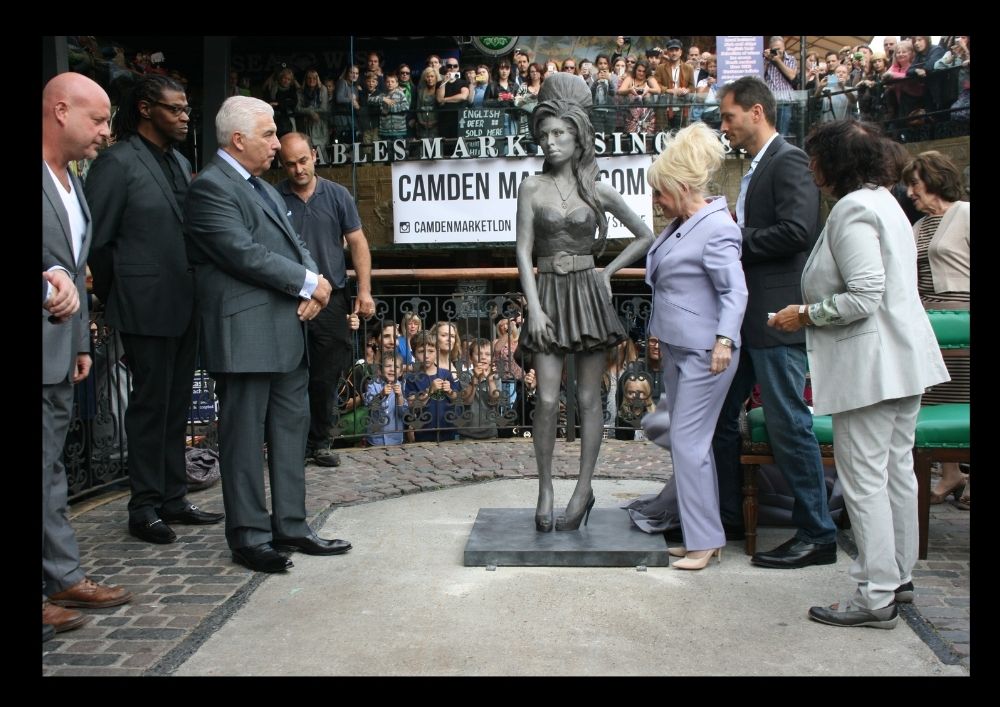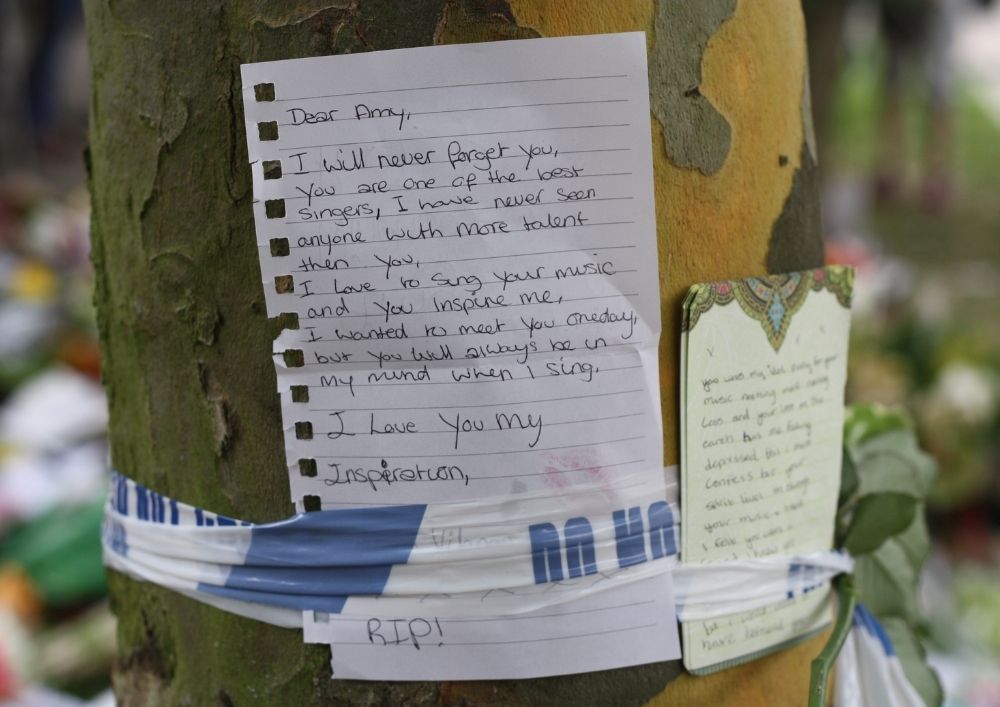Our Amy: A remarkable legacy and a resolve to make sure nobody suffers like Amy
Foundation set up in her name has helped thousands
Friday, 23rd July 2021 — By Dan Carrier

A statue of Amy Winehouse unveiled at Camden Market in 2014 by guests Barbara Windsor and Lee Bennett
IT was during the numbing aftermath of Amy Winehouse’s sudden and untimely death that the idea was formed, and it was a natural reaction of a grieving family – let no one else go through what we are experiencing.
Jane Winehouse, Amy’s stepmother, recalls how in those dark days 10 years ago the family knew they needed to turn the impact Amy – just 27 when she died –had made on the world while she was alive into something that continued long after her passing.
“It is not unusual for charities to be born out of a tragedy,” Jane, a co-founder and the managing trustee of The Amy Winehouse Foundation, told the New Journal this week.
“So many have started through somebody losing someone through a condition, a disease, an illness. There is a strong compulsion to do something about it and try and make it better for other people, and stop others going through something they have experienced. It was not an unusual reaction.”
And Amy’s life gave relatives a platform to ensure they could make a long lasting impact.
“Amy had a worldwide resonance and appeal, and we felt if we couldn’t do something positive with that, it would be a travesty, and honestly, we all needed some kind of positive purpose,” added Jane. “I do not know how Mitch [Amy’s father] would have coped without the foundation.”
The Foundation has excelled in looking into the issues around addiction which contributed to her death, but remembering the things that made the world a special place for Amy.
That meant a combination of music and helping young people.
“Amy had issues she struggled with, and we knew our work would also involve music, so we started out on a quest to help young people,” said Jane.
“Amy always loved young people, always interested in what was happening in others’ lives. She would help others. That was a starting point – and it has grown into something much more than that.”
Unlike many well known faces who parade their charitable work, Amy quietly got on with helping others.
“We knew she did a lot of charitable events, but we only found out after she died quite how many charities, causes and individuals she supported.
When we realised this, the Foundation made total sense,” said Jane. “I recall once she was in America and had promised to perform in London for a charity, so she flew in just for the night and went straight back to the United States the following morning. “She was always that committed. She did not want to let any one down.”
The Foundation has strong roots in the area that Amy loved. “We are very much a Camden organisation,” added Jane. “We started off in a back room of Metropolis Music in Kentish Town and we set out to support Camden charities. “We made donations to the Roundhouse and WAC Arts, and we did a programme for young women at the Clean Break Theatre Company, that works in the prison system and is based in Patshull Road.
Jane added: “We have also supported the London Irish Centre – Amy was their neighbour, and loved the centre. She would go there regularly and she always felt very much at home. She knew how important Camden’s Irish heritage was.”
As the Foundation developed, three core aims emerged: informing and educating young people about mental health and the effects of drugs and alcohol, providing support for vulnerable people at high risk of misuse, and to support the development of disadvantaged children and young people through music.
The Foundation employs educators, many of whom are in recovery from drug or alcohol problems, to discuss mental health and the risks of negative coping strategies such as drug and alcohol misuse.
Going to schools, colleges and youth centres, the Foundation avoids using the traditional approach of simply providing basic information or “scare” tactics. “We work with young people, parents and teachers to look at underlying causes – and their consequences,” said Jane.
The Foundation supports young people, brings information into schools and has a wide programme across Camden and elsewhere and the project has been monitored by academics from both the University of Bath in the UK and Harvard in the US.
It has become one of the largest school-based alcohol and drug education programmes ever delivered by a charity in the UK. As well as prevention, Amy’s family had been aware of the difficulties in sourcing rehabilitation programmes while she was alive.
Contacted by others who had relatives suffering from addiction, they were all too aware of the gaps in services that meant if you could not afford privately run services, you may not get any help at all.
Jane feels that lack of care that has grown worse in the years since, with cuts to a third of funding to rehab programmes for young people over the past five years.
“It was bad 10 years ago, and it is even worse now – funding for rehab for young people is very little,” said Jane.
“Mostly drug and alcohol advice was either not meaningful or simply not there. “We discovered that young women found it hard to get structured treatment and rehabilitation, and when they came out from rehab, many did not have a safe place to go to.”
The answer is Amy’s House, which offers a safe home for those recovering. Based in north London and made up of 16 self contained flats, staff tailor help to each persons needs.
“Amy’s House is for people who have gone through treatment and and need to be in safe place to start their lives again, grow as people and live without substances,” said Jane. “Many will be overcoming histories of abuse and trauma.

One of hundreds of tributes left in Camden Square after Amy Winehouse died
“Research shows women have a far greater chance of relapsing into drug and alcohol use if they don’t have the right kind of support, which understands their situation.
The third raft of help Amy’s legacy brings focuses on music. The Foundation runs programmes in both the UK, St Lucia – where Amy lived and worked for a time – and New York. It includes including music therapy in children’s hospices and schools outside mainstream education, and music tuition. “
For children with life-limiting conditions, music therapy can help to address important developmental needs,” said Jane.
“Not least because it provides an excellent means to increase a child’s communication, interaction and social skills as well as enhancing physical skills and promoting their overall wellbeing.”
“Many we have supported have gone on to play professionally,” Jane says.
“But it is more than that – music and the arts is about enriching lives. “All this is Amy’s doing. Without her, none of this would ever happened.”